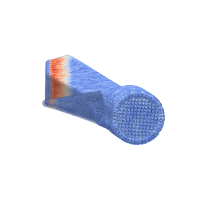FLEXMAP – Flexible and Efficient Data Mapping for Simulation of Coupled Problems is a project by Benjamin Uekermann that was approved by the Deutsche Forschungsgemeinschaft (DFG) at the end of last year. The goal of the project is to develop and implement more flexible data mapping concepts for coupled simulations. This includes, for instance, solver-specific data mapping, dynamic changes of coupling meshes, and large-scale data mapping.
Coupled problems and multi-physics simulations are an important topic of research since longer. There is, however, a strong need for innovation right now. Today, oftentimes individual simulation models are well understood and implemented in complex legacy codes. New application insights can no longer be extracted from single simulation models, but need the coupling and interplay of more and more simulation models. Moreover, the simulations one wants to couple become more and more disparate: particle versus mesh-based models, different dimensions, different length- and time-scales, stochastic and deterministic models. Even a new class of models flourishes these days: reduced and learned models, which might show their full potential when used together with (i.e., coupled to) classical simulations. With these new data-based models, also new communities that develop simulation models enter the picture. At the same time, one already possesses the necessary compute resources to simulate multiple simulation models simultaneously. What the research community still lacking are methods and software to properly couple multiple models.
In recent years, preCICE has become the quasi standard open-source solution for surface-coupled mesh-based simulation, in particular fluid-structure interaction. preCICE is a community project with hundreds of users spread over many application fields: aerodynamics, astronautics, automotive manufacturing, wind energy, biomechanics, biomimetics, marine engineering, nuclear fusion, reactor safety, geophysical systems, and more.
In FLEXMAP, Uekermann and his team will develop a new mesh handling strategy in preCICE and new numerical data mapping methods that can be computed with dynamic locations. The rigid mesh and data mapping concept of preCICE will be loosened up. This will allow users of preCICE to perform non-standard coupled problems; such as mesh-particle coupling, volume coupling, or coupling with higher-order discretizations.
All existing users of preCICE from their diverse application fields will highly benefit and very likely new users will be attracted. The new concepts improve the maintainability of already coupled codes and decrease the development effort required to couple new codes. This is why the project also enables new research in application fields, in addition to contributing to progress in its own field. Overall, the project contributes to better cope with the ever-increasing complexity of models and simulation software. At the same time, it also directly benefits from SimTech through the large available expertise on simulations of coupled problems (including mesh-particle coupling), higher-order discretizations, and on research software engineering. Finally, the project also reaches beyond SimTech by working with and coupling to further internationally well-established simulation software (MercuryDPM, XDEM, OpenFOAM, SU2, deal.II).
Benjamin Uekermann is a junior professor for Sustainability and Usability of Simulation Software within SimTech. He is an expert on partitioned simulation of coupled problems from the numerical perspective, the high-performance computing perspective, and the software engineering perspective. He developed numerical coupling approaches based on quasi-Newton methods, waveform relaxation, and radial-basis function interpolation as well as parallel algorithms for coupled problems. Uekermann is the lead developer of preCICE and its secondary software packages. In SimTech, he leads the project PN 5-9 “Adaptive and Flexible Macro-Micro Coupling Software”. PN5-9 investigates concepts on how to apply preCICE for black-box macro-micro coupled problems.


